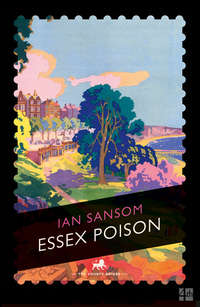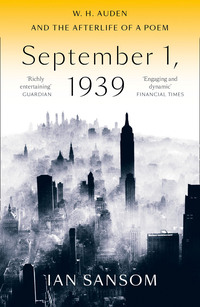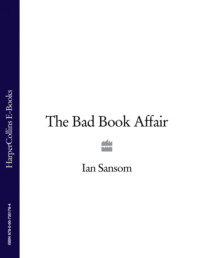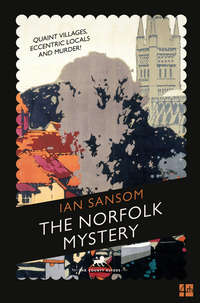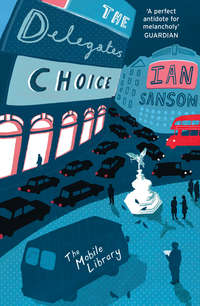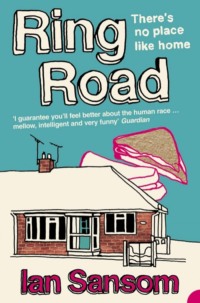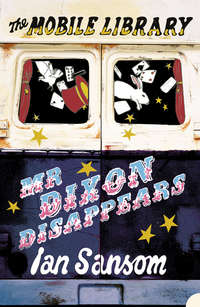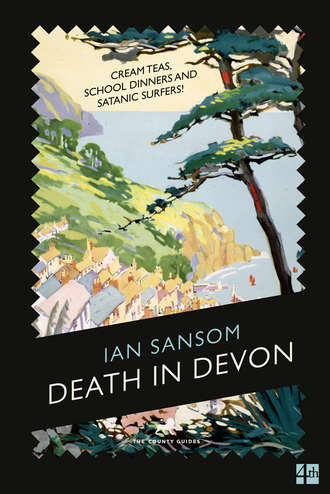
Полная версия
Death in Devon
‘Medicine may well have something to say on the subject of whether women should ride astride once they have reached maturity,’ Morley had remarked. ‘Side saddle is surely the appropriate method, wouldn’t you agree, Sefton?’
‘I’m not sure,’ I said.
‘Oh, come, come,’ said Miriam, cocking her head rather. ‘Surely you must have an opinion on the question of women’s riding styles?’
‘It is a matter about which I have no opinion whatsoever,’ I said.
‘Such a shame,’ she said, revving the engine unnecessarily.
‘Thank you,’ said Morley. ‘No need.’

For navigational purposes Morley had cut up and mounted onto thin oak boards a large Philip’s Road Atlas of Britain, dividing England county by county into squares of approximately nine by six inches. It was my job to arrange these giant county playing cards, as it were, into some kind of meaningful hand, and then to deal out the route, card by card, to Miriam, with Morley adding his own inevitable comments and elaborate instructions: ‘Avoid Cambridge at all costs, Miriam – whole place stagnant with marshes and dons!’; ‘Ah, yes! Beautiful lute-like Berkshire! Belly to the west, neck to the east!’ Etcetera, etcetera. Morley would also make requests for ludicrous detours and stopping points – ‘Do we have time for a dawdle through Hampshire?’ ‘Up to Bristol? Cardiff?’ – which Miriam, thankfully, resisted.
‘This is the route, Father, that we are sticking to, if we wish to arrive any time today. Repeat after me: Norfolk, Cambridgeshire, Bedfordshire, Buckinghamshire, Berkshire, Wiltshire and Dorset.’
‘And Devon!’ cried Morley.
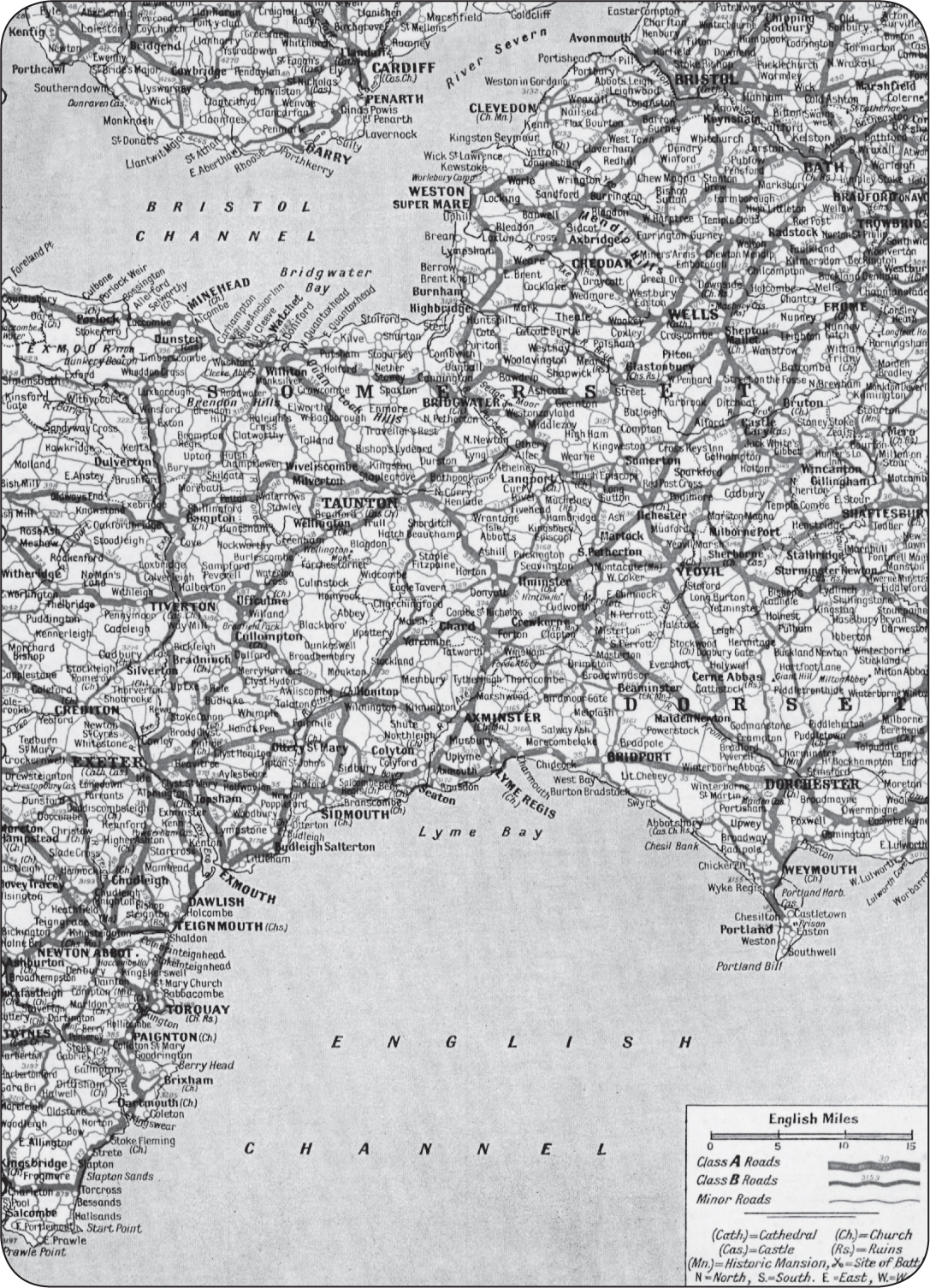
A giant county playing card
‘Obviously,’ said Miriam. ‘No slacking. No shilly-shallying. No funking.’
‘No Bristol?’ said Morley.
‘Correct,’ said Miriam. ‘And no Bath, no Basingstoke, no Bournemouth. So please don’t ask. I have the wheel, Father. Mine is the power.’
‘Onwards, Boudicca!’ cried Morley. ‘To defend the nation!’

We stopped for a filthy tea somewhere near Salisbury, at the inexplicably named Nell Gwynn Tea-Rooms, a place decorated both inside and out with an unfortunate combination of fake wooden beams and very shiny yellow bricks.
‘A Tudorbethan lavatory,’ said Miriam, as we pulled up. ‘How quaint.’
‘Worse than Mugby Junction,’ said Morley, which seemed to be an allusion to something or other: it certainly made Miriam laugh. They often enjoyed little jokes like these, based on a lifetime’s shared experience and reading: I imagine Milton and his daughter might have enjoyed similar happy reminiscences. Our Nell Gwynn tea consisted of cold potato soup and rather hard and arid little rolls which produced in us all such indigestion that we had to consume several packs of Morley’s favourite mints in order to overcome the aftertaste. (These mints – Bassett’s People’s Mints – are not to be confused with actual Morley Mints, which were at one time produced by the manufacturers of Uncle Joe’s Mint Balls, and which Morley consumed in incredible quantities. ‘Insufficient weaning,’ Miriam would traditionally reply, when Morley asked for another of his mint balls, and ‘Oh, do spare us your Freud,’ he would traditionally respond, popping another into his mouth.)

And then finally, towards evening, after much indigestion and some confusion in my dealing of the county cards – I had accidentally confused Somerset with Dorset, sending us on a rather round-about route – we made it to Honiton. The weather had remained calm all day, but now the sky closed in again, menacing, threatening more rain. This did not, however, dampen Morley’s mood.
‘At last!’ he cried. ‘Honiton! Gateway to the Riviera!’
I looked around as we sped through the streets – street, really – of Honiton.
‘Really?’
‘Indeed, Sefton. Welcome to Devon! So, what are we looking forward to most in Devon, Sefton?’
‘Erm …’
‘Yes, Sefton,’ called Miriam. ‘What are we looking forward to most in Devon?’
‘In Devon?’
‘Yes,’ said Morley. ‘Or Dumnonia, as I believe the ancient kingdom was once called.’
‘And don’t say the cream teas!’ called Miriam from the front seat.
‘The …’
‘Moors, of course,’ said Morley. ‘Yes. Correct. Dartmoor. Exmoor.’
‘Of course,’ I said.
‘And it is renowned for what else, Devon? Topographically, geographically, I mean?’
‘Well, there are the moors, obviously, and …’ I was struggling rather.
‘The fact that it is the only one of our counties to be in proud possession of not one but two coastlines!’
‘Ah.’
‘Correct! And any other particular places and sights of interest? I am myself particularly looking forward to visiting Torquay United, Exeter City and the mighty Argyle. But you’re not a fan of association football, are you, Sefton?’
‘Well, no, I’m more of a—’
‘Lah-di-dah?’ said Morley. ‘But we’ll say no more about it. What about you, Miriam?’
‘I can’t wait to just strip off and get into the water,’ she called. ‘I’ve brought my costume. Have you brought yours, Sefton?’
I forbore to answer.
‘It’s emerald green,’ she said.
‘And some rockpooling perhaps,’ said Morley. ‘Crabbing. I do love a spot of crabbing.’
‘And surfing,’ said Miriam.
‘Indeed,’ said Morley. ‘Now, Devon: patron saint? Sefton?’
‘St Petroc?’ said Miriam.
‘Good guess. But wrong. Cornwall, Petroc. Though I believe he did pass through on his way down. St Winfrid I think is Devon’s, isn’t that right?’
‘Possibly, Father.’
‘Also the patron saint of?’
‘Germany?’ said Miriam.
‘Correct.’
‘And?’
‘Don’t know, don’t care.’
‘Brewers,’ said Morley.
‘Sefton will feel right at home then.’
I blushed rather.
‘And we must make a visit to the Dartmouth pixies, Miriam, while we’re here. Or piskies, as I believe the locals call them. Pharisees, as they are known in Sussex. The little people. They like to ride ponies and lead unwary travellers to their doom in the bogs on the moors, isn’t that right, Miriam?’
‘Yes, Father.’
‘Pixies?’ I said.
‘Indeed.’
‘You’re not serious?’
‘Deadly,’ said Miriam. ‘Deadly serious.’
‘Pixies?’
‘Oh yes,’ she said. ‘Absolutely. Father is as serious about his pixies as Conan Doyle was about his fairies. Didn’t you know? Deadly, deadly serious.’
‘I see,’ I said. ‘Well, I suppose we must allow for the possibility of—’
‘Of course he doesn’t believe in pixies, Sefton!’ cried Miriam.
‘Joke!’ cried Morley. ‘Jolly good, Miriam.’
They roared with laughter: they had a curious sense of humour, the pair of them.
‘Pixies!’ cried Morley, tears coursing down his face. ‘Pixies!’
‘Pixies!’ cried Miriam, sobbing with laughter also.
‘Do you think I have entirely taken leave of my senses?’ This was not a question that required an answer. He wiped the tears from his eyes.
‘People will believe anything, won’t they?’ said Miriam.
‘Indeed they will, my dear,’ said Morley. ‘Indeed they will.’
‘Ghoulies and ghosties!’
‘Gremlins and goodness knows what,’ said Morley. ‘Do you know Yeats’s poem “The Land of Heart’s Desire”, Sefton?’
‘I’m—’
He began to intone, in Yeatsian fashion:
The Land of Faery Where nobody gets old and godly and grave, Where nobody gets old and crafty and wise, Where nobody gets old and bitter of tongue.
‘Pure fantasy,’ said Morley. ‘Absolute nonsense.’
‘Pixies!’ cried Miriam.
‘Pixies!’ echoed Morley. ‘Marvellous! Marvellous!’
And so, in characteristic fashion, we arrived at our destination.

CHAPTER 4
THE VERY BOUNDARIES OF ENGLAND
ROUSDON, according to White’s History, Gazetteer and Directory of Devonshire (1850) – a copy of which Morley had usefully brought with us, along with several other dusty old directories, including Pigot’s, Kelly’s and Slater’s, and a small suitcase-worth of up-to-date guidebooks to the geography, topography, history, culture, coastal scenery and cider-making heritage of a county that most of them insisted on referring to, inevitably, at some point in their Exmoor sheep-herd-like ramblings as ‘Glorious’ – ‘is an extra parochial estate belonging to R.C. Bartlett Esq., and lying within the bounds of Axminster parish, adjoining the great landslip of Dowlands and Bindon’.
This hardly does the place justice. Rousdon is not merely extra parochial. It is ultra-extra parochial. It is far, far, far beyond the parochial. It might best be described as a place at the edge of the world.
The land, with its few original buildings, according to all accounts, was purchased some time around 1870 by a Sir Henry Peek, who undertook various schemes of improvement, including rebuilding the existing church, providing a small school, the vast mansion, a coach house, a bake house, farm buildings, cottages, a walled garden, tennis courts, and every other possible kind of dwelling, convenience and requisite for what became effectively a small private village. The Peek family – latterly Peek Brothers and Winch – had made their fortune as importers of tea, coffee and spices, and Rousdon does indeed have rather the feeling of a plantation complex, ‘with all the appearance of having been planned by the Tudors, built by the Jacobeans, and completed by the Victorians’, according to Morley in The County Guides, ‘and with perhaps just a touch of the Lombardic, in what one might generously describe as an act of freestyle Anglo-Euro-Renaissance sprezzatura’. For all its undoubted pizzazz and sprezzatura, the estate’s development was in fact overseen and undertaken by a redoubtable Englishman, Ernest George, who was one of Morley’s great heroes, and responsible also for Cawston Manor in Norfolk, one of Morley’s favourite English houses, and Golders Green crematorium – undoubtedly his favourite crematorium.
The estate is approached by a long driveway, though since it was dark by the time we arrived, having stopped off at Lyme Regis in order for Morley, in his words, to ‘acquaint myself with some ammonites’, I wasn’t aware initially of the extraordinary dimensions of the place and it wasn’t until we – just – managed to stop the car at the bottom of a steep, deep dark lane, our having taken another wrong turning in a maze of roads, that I realised that the entire estate seemed to have been built along a clifftop that dropped precipitously down to the sea.
Rousdon isn’t just isolated: it is simply on its own. It is one of the very boundaries of England. And we were about to go sailing headlong over the edge of it …
Morley, as usual, was expounding on some subject or another, Miriam was energetically riposting, and I was doing my best to keep the peace. None of us was paying much attention to what was ahead. Fortunately we were travelling slowly, and it seems we all at once caught a glimpse of the cliff’s edge and the moon on the sea beyond it. Miriam gave a yelp, Morley uttered, accurately, if not entirely helpfully, ‘Thalatta! Thalatta!’ and I realised that if nothing was done then the fate of the overloaded Lagonda, stationery, surfboards, passengers and all, was going to be not dissimilar to that of the steam train in Buster Keaton’s The General (a film that Morley writes about at great length in his book Morley Goes to the Cinema, published in America as Morley’s Movies, a misleading title which rather implies that Morley himself were a film star, which he most certainly was not; his personality, if anything, was too big, too boisterous and too boundless for the silver screen; he was, I often thought, a strictly novelistic character, a panoramic soul from a panoramic story, of the kind found in the pages of Balzac, or Victor Hugo).
I yelled ‘Stop!’, leapt up out of my seat, leaned across and yanked on the handbrake. Miriam stamped on the footbrake, and Morley …
Morley had leapt out of the car – I thought initially to save himself from what might have been certain death. As it turned out, to my astonishment, he’d leapt out only to get closer to the cliff edge, where he immediately launched into another recitation. This time it was Kipling, ‘Mandalay’:
Ship me somewheres east of Suez, where the best is like the worst,
Where there aren’t no Ten Commandments an’ a man can raise a thirst;
For the temple-bells are callin’, an’ it’s there that I would be –
By the old Moulemein Pagoda, looking lazy at the sea.
‘Well,’ said Miriam, rather breathless, ‘we certainly seem to have found the limits of the estate, Sefton.’
‘Quite,’ I agreed.
‘I could have sworn the sign for the school pointed down this way.’
‘Apparently not,’ I said.
‘Did you see the sign, Father?’
‘Sign?’
‘For the school?’
‘No idea,’ said Morley. ‘But I think we might be able to climb down here, actually. Onto a little beach.’ He was standing perilously close to some loose scree.
‘Father!’ called Miriam. ‘For goodness sake, not tonight!’
‘A night-time descent might be rather fun,’ said Morley, staring down, illuminated by the headlamps of the car and framed by the bright-lit moon, making him appear rather like his own ghost, or a velvety shadow puppet.
‘We’re going back to find the school, Father.’
‘But—’
He had edged close enough now for us both to be concerned about his safety.
‘Should I?’ I asked Miriam.
‘Would you mind awfully?’ she replied.
And so I jumped out of the car and edged close enough to Morley to make a grab at his clothes if he were to lose his footing.
‘What do you think, Sefton?’
‘It is certainly a steep cliff-face, Mr Morley. And we’re all rather lucky not to be heading over the edge.’
‘Five-hundred-foot drop, would you say?’
‘Something like it,’ I said.
‘V. diff., do you think?’
‘V. diff.?’
‘Climbing-wise.’
‘Yes,’ I said, not entirely sure what he meant.
‘Straight down to a nice little hidden beach.’
‘Indeed. Quite a drop.’
‘Into the ocean.’
‘Indeed.’
‘The abyss – tehom, in the Hebrew, isn’t it? “Draw me out of the mire, that I may not stick fast: deliver me from them that hate me, and out of the deep waters. Let not the tempest of water drown me, nor the deep swallow me up: and let not the pit shut her mouth upon me.” What is that? Psalms … 68? 69?’
‘I don’t remember exactly.’
‘Ever done any mountaineering of any kind, Sefton?’
‘I can’t say I have, Mr Morley, no.’
‘Well, we’ll have to put that right. I was lucky enough to have climbed with Mallory and Sandy Irvine. Long time ago. Do you know Lisle Strutt?’
‘No, I’m afraid not.’
‘Glad to hear it. President of the Alpine Club. I resigned in protest. Not a fan.’
‘Father, come on!’ said Miriam. ‘Enough shilly-shallying. It’s late.’
‘Next trip, we’ll bring along some rock boots and rope and see where it takes us, shall we?’
‘That sounds like an excellent idea,’ I said. ‘I look forward to it.’
‘Not tonight though, chaps, eh?’ cried Miriam, who had lit a cigarette and who seemed to have instantly recovered from our near-death experience and was enjoying the cool breeze from the sea. She, like her father, rather enjoyed risk-taking, near-misses and every other kind of calamity. Neither of them, of course, had ever been to war.
‘Thing to remember, Sefton,’ said Morley, as we made our way back to the car, ‘is that the top of the ascent is the most dangerous part of any climb. The summit, you see. Gets the old heart racing.’
‘Is your heart racing, Sefton?’ said Miriam, as we clambered back into the car.
I was in fact feeling my stomach grumbling – we hadn’t had anything to eat since our filthy Nell Gwynn buns.
‘You know, we could camp out here for the night,’ said Morley. ‘Do you remember we used to do that when you were young, Miriam? In the old Standard? It had the detachable front seats, and your mother would—’
‘Not tonight, Father,’ cried Miriam.
‘“Only the road and the dawn,”’ said Morley, ‘“the sun, the wind and the rain, / And the watch fire under stars, and sleep and the road again.”’
‘Not tonight, thank you, Father!’
‘Very well,’ said Morley.
‘Onwards!’ said Miriam.
‘Or backwards,’ said Morley, ‘to be accurate.’
‘Thank you, Father.’

Eventually managing to reverse back up the lane in the Lagonda – after much pushing and the grinding of gears – we picked up another route and soon found ourselves stopping in a courtyard outside an enormous building that by all appearances – mullioned windows, finialled gables, coats of arms and what-not – had to be the main Rousdon manor house. We had arrived at All Souls.

CHAPTER 5
A SODALITY OF PEDAGOGUES
AT THE SOUND OF OUR APPROACH the vast door of the manor house was swung open by a worried-looking young woman, apparently a nurse, who was done out in a most striking outfit, consisting of a blood-red dress with a white apron over it, and a little Sister Dora cap perched jauntily on her head, which gave her the appearance of someone having just rushed panicking from performing some particularly grisly surgery. From behind this rather ghoulish creature first came there a voice, and then a man, shuffling into view.
‘Do I hear John Bull’s roar?’ cried the voice. ‘The People’s Professor?’
‘You have been in Afghanistan, I perceive,’ Morley said to the figure who now stood in the doorway. Their exchange of words caused much mutual amusement – it was some kind of private greeting, I understood. There was then a prolonged and vigorous shaking of hands – the two men seemed to operate on the same frequency and gave off exactly the same vibration of relentlessly hearty vigour – and Morley then introduced us.
‘This is Dr Standish,’ he said. ‘Headmaster of All Souls.’
‘Well, well, well,’ said Dr Standish. ‘What do we have here?’
What we had here was a man who might almost have been Morley’s double, though perhaps a little more careworn, his face perhaps rather coarser-featured, his cheeks perhaps a little redder and rounder, his moustache rather more drooping, and his eyes small and hard and bitter, like a blackbird’s.
‘This is my assistant,’ said Morley, ‘Mr Stephen Sefton.’
‘Your Boswell, eh, Swanton?’ said Dr Standish, in a rather sniggering fashion, I thought.
‘I don’t know about that,’ I said. We shook hands: he gave off a slight whiff of lavender, as though having only recently bathed.
‘I have always been of the opinion,’ said Morley, ‘that the Great Cham was in fact a fictional character invented by the scheming Scotsman as a way of making a reputation for himself.’
‘Ha ha! Very good!’ said Dr Standish, smiling and showing a set of gleaming teeth. ‘Though I’m sure such treasonous thoughts are far from the mind of your young assistant.’
‘Indeed,’ I agreed. Nothing could have been further from my mind.
‘And this is my daughter,’ said Morley.
‘Charmed,’ said Miriam, offering her hand, and simpering rather.
‘Well, well,’ said Dr Standish. ‘You have grown up since last we met.’
‘Indeed, we are now full-grown,’ said Miriam, hoisting herself up to her not inconsiderable height, and gazing at him, mesmerisingly, in her fashion, over her cheekbones.
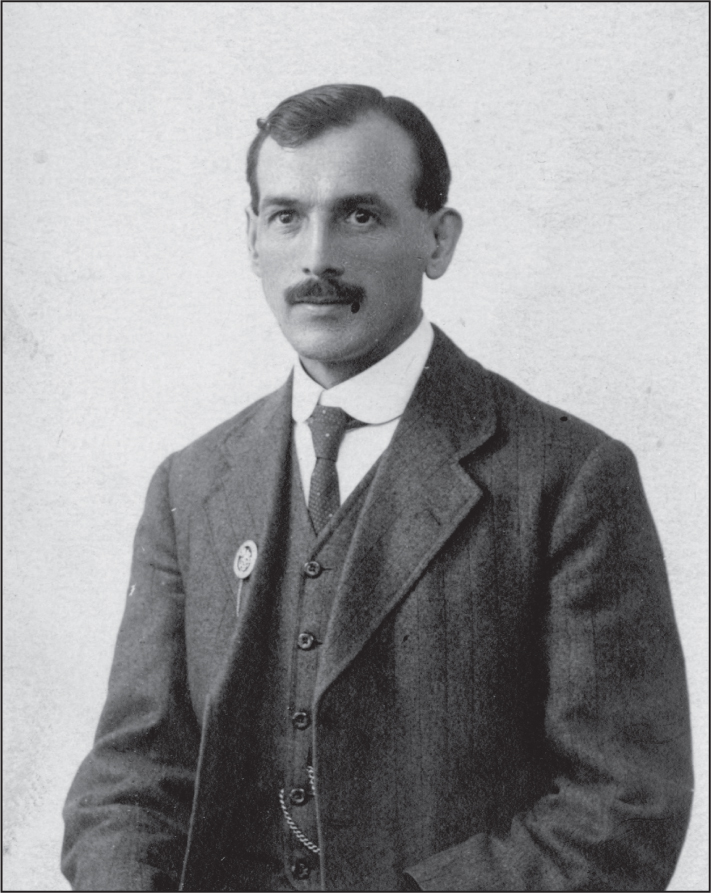
Puer Aeternus, The Eternal Boy
‘You haven’t aged, though, Headmaster,’ said Morley.
‘Well, teaching keeps one young, I suppose.’
‘Puer Aeternus,’ said Morley. ‘The Eternal Boy.’
‘Indeed,’ said Dr Standish. ‘No need to stand on ceremony though, old friend. Come in, come in, come in!’

Given Morley’s well-known quirks and attributes – his extraordinary working habits, his odd detachment from others, his fixation on objects, his obsession with classification, and his complete and utter inability to understand or to be able to empathise with others – one might have suspected that he would have found close relationships almost impossible to maintain. In fact, as I was to discover during the course of our time together, he was a man who attracted and enjoyed the company of all sorts of individuals, of both sexes, of all ages, all classes and all kinds. Of course above all he attracted fans, with whom and about whom he was always polite and courteous. Much of my time was spent protecting him from these fans, and from all sorts of other less well-meaning hangers-on and acolytes. (He was most often beset and troubled by those whom one might call Morley-mimickers: one thinks most readily perhaps of Frederick Bryson and John Fry, Morley-mimickers of brief renown. Such individuals often started out as fans, became acolytes, and then attempted to actually become Morley – ‘stealing our bread from the table’, as Morley often complained – trying to forge careers as hacks and popular writers, though none of them could match Morley’s own ferocious output. About such types Morley could be surprisingly and shockingly discourteous. Bryson, for example, I recall him once describing as a ‘sunburned nut’: he famously kept a house on the French Riviera. And Fry he often referred to simply as ‘the Pygmy’: he was a man famously short in stature.) But Morley also had real actual friends, and Dr Standish was one of them: he had contributed to a number of volumes edited by Morley for the edification of the young, including Manners Maketh the Man: A Guide for Parents and Teachers (1932), and A Boy’s First Fingering: Easy Piano Pieces for Small Hands (1934).

While the two men caught up with all their news and gossip, Miriam and I were shown through by the nurse to what seemed to be the old drawing room of the manor house, which had been converted into the school’s staff common room. The transformation had been entirely successful – and was, of course, quite appalling. Noticeboards had been erected on the oak-panelled walls, a long coat-rack was hung with gowns and mortarboards, and where there once might have been pleasing arrangements of bibelots, vases and ornaments there was now a mess of packets of chalk, cigarettes, brass ashtrays and bottles of ink. An elephant’s foot umbrella-stand in one corner held a quiver of canes, ranging from a thin-strip willow to a heavy hardwood beater. Windows high up allowed for no views, and little natural light. I knew exactly what the place had become, having wasted so much of my time over the course of the past five years in similar rooms throughout the country. It was a place for the gathering of the unredeemed before their trials: we had come upon a sodality of pedagogues.


